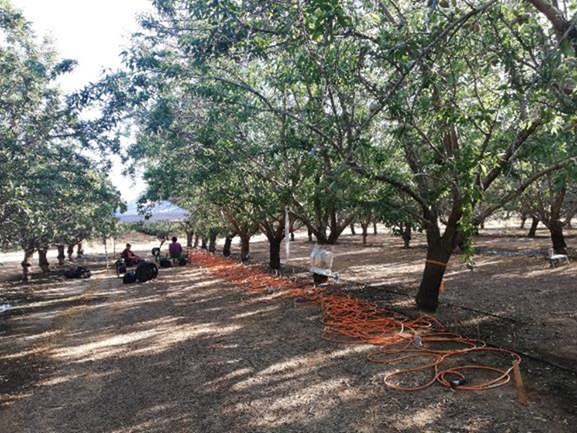The study is looking to balance farmers’ sustainable management practices while improving their overall crop productivity
By BRANDON NGUYEN –– science@theaggie.org
Amid the unpredictable impacts of climate change, UC Davis has been recently awarded $10 million in grant funding by the U.S. Department of Agriculture’s National Institute of Food and Agriculture. Researchers from a wide range of fields — from socioeconomics to agricultural groundwater and soil health — will collaborate to optimize groundwater and agricultural irrigation sustainability in the Southwest for farmers to improve crop yield and cost efficiency.
Isaya Kisekka, an associate professor of agrohydrology and irrigation at UC Davis, will be leading a massive collaborative study with a team of researchers from California, Arizona and New Mexico to develop climate adaptation strategies that effectively sustain groundwater quantity and quality as well as irrigated agriculture.
Kisekka introduced the climate issue that the study tackles and the limitations that farmers currently face.
“In California, we are always experiencing droughts and floods, the climate extremes,” Kisekka said. “During the drought, farmers typically rely on groundwater or in the past, they have relied on groundwater until 2014 when Gov. Brown passed a new law called the Sustainable Groundwater Management Act that limited how much water would be pumped in from groundwater. And so, if growers cannot pump groundwater during periods of severe drought, what can they do?”
Depleting and overdrafting groundwater can have serious consequences, leading to groundwater deterioration and land subsidence where the land starts to sink, affecting infrastructure like roads and canals. Kisekka and his team understand that many communities’ economies depend on irrigated agriculture, so balancing sustainability and production is the goal of the study.
“Growers have increasingly depended on groundwater during multi-year droughts and heat stress,” according to a recent UC Davis press release. “Part of the five-year project includes looking into aquifer systems in California’s Central Valley, central Arizona and the lower Rio Grande basin in New Mexico. These regions have all experienced unprecedented overdraft, which happens when more water is pumped from a groundwater basin than is replaced from sources, including rainfall.”
California is the largest agricultural state in the country, with agricultural receipts exceeding $50 billion, according to Kisekka.
“California’s agricultural sector is a huge industry,” Kisekka said. “But that industry relies heavily on water, because we are in semi-arid climates, with many growing areas having the Mediterranean climate where you don’t get a lot of rain during the summer.”
Iael Hoffmann, a postdoctoral at Kisekka’s lab studying agricultural water and nitrogen management, provided insight into how she is contributing to the study’s development of agricultural management strategies through her project in the Central Valley.
“We are looking into how management practices like processing tomato rotation fields affects groundwater quality,” Hoffman said. “So we’re measuring irrigation, water and nitrogen balances, but at the field scale, at soil scale and also at the groundwater scale. So we’re monitoring these three levels.”
The core of Kisekka’s project is the development of better data and tools for farmers to optimize their growing practices toward more sustainable groundwater and irrigated agriculture. Kisekka provided examples of what his team of researchers plan to do for long-term sustainability of groundwater.
“One of the things we’ll be doing is managing aquifer recharge, where during a drought, we flood agriculture fields and make the water salt into the ground to recharge groundwater, which can be topped during the dry periods,” Kisekka said. “We are also developing best management practices on soil health, for example, using cover crops and other soil amendments to increase the ability of the soil to store water, also to make the crops more resilient either during a heatwave or severe drought. We’re also looking at smart technologies, like remote sensing and artificial intelligence so growers can start to use data to optimize decision making.”
These are just a few of the many potential management practices Kisekka and his team will be working on for farmers to best optimize their growing practices while sustaining groundwater under the limitations of the Sustainable Groundwater Management Act.
The future of agricultural practices is evolving, and Kisekka commented on what changes will need to be made to adapt to the constantly changing climate.
“Agricultural practices will have to be smart,” Kisekka said. “In some ways, it may be a smaller footprint, but more intensified. So you’ll have sustainable intensification of already very intensive systems. Instead of expanding the number of acres we are growing, we may cap or even decline a little bit, but productivity will increase. And [there] will be more use of data to make decisions and technology in general.”
Written by: Brandon Nguyen — science@theaggie.org









